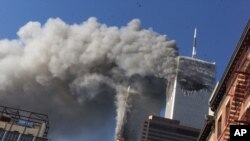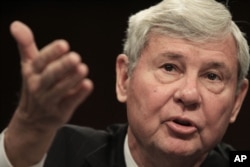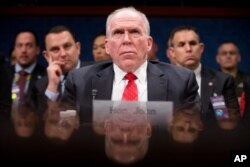Former U.S. Senator Bob Graham says Americans are "fully capable" of making up their own minds about 28 classified pages that discuss possible foreign support for those who carried out the September 11, 2001 terror attacks.
The pages are from a joint congressional committee report that came out 14 years ago, but then-President George W. Bush ordered that chapter not be included in the public release of 800 other pages. Some officials with access to the chapter have made comments alluding to Saudi Arabia, but without being able to offer details the exact connections suggested remain a mystery to most of the country.
"My oath of confidentiality forbids me from discussing the specifics of that material. But while I cannot reveal those details, I strongly believe the American people deserve to know why this issue is so important," Graham wrote in an op-ed published late Wednesday by the Washington Post.
He has been a strong advocate in the push to have the pages released to the public. He said a White House official told him President Barack Obama would make a decision by June and that he viewed that as a "step in the right direction."
Graham wrote that his optimism from that conversation faded after seeing an interview CIA Director John Brennan gave on NBC's Meet The Press on May 1.
Brennan: information 'unvetted', 'uncorroborated'
Brennan said the information in the 28 pages "was not corroborated, not vetted and not deemed to be accurate." He said the work of the congressional committee was only a first step, with its leads followed up by the later, more extensive 9/11 Commission Report that determined there was no evidence indicating links between the Saudi government or Saudi individuals and al-Qaida.
"I think some people may seize upon that uncorroborated, unvetted information that was in there, that was basically just a collation of this information that came out of FBI files, and to point to Saudi involvement, which I think would be very inaccurate," Brennan said.
Graham called that comment an affront to the American people and those whose family members and friends were killed in the attacks in New York, Washington and Shanksville, Pennsylvania.
Questions about financing
The 9/11 Commission Report, released in July 2004, said there was no evidence of any official foreign funding for the terror group. It did not, however, rule out "the likelihood that charities with significant Saudi government sponsorship diverted funds to al-Qaida."
Graham wrote that releasing the classified pages would allow Americans to evaluate whether the hijackers of four passenger planes who killed nearly 3,000 people had help, and if so, from whom. He said they would also be able to weigh whether the delay in the release had any effect on national security, delayed justice for the families of the victims or undermined people's confidence in the government.
Saudi Arabia
White House Deputy National Security Advisor Ben Rhodes said last month he expects Obama will order "some degree of classification that provides more information," but that the 9/11 Commission and the congressional committee have definitively determined Saudi Arabia had no intent to support al-Qaida.






